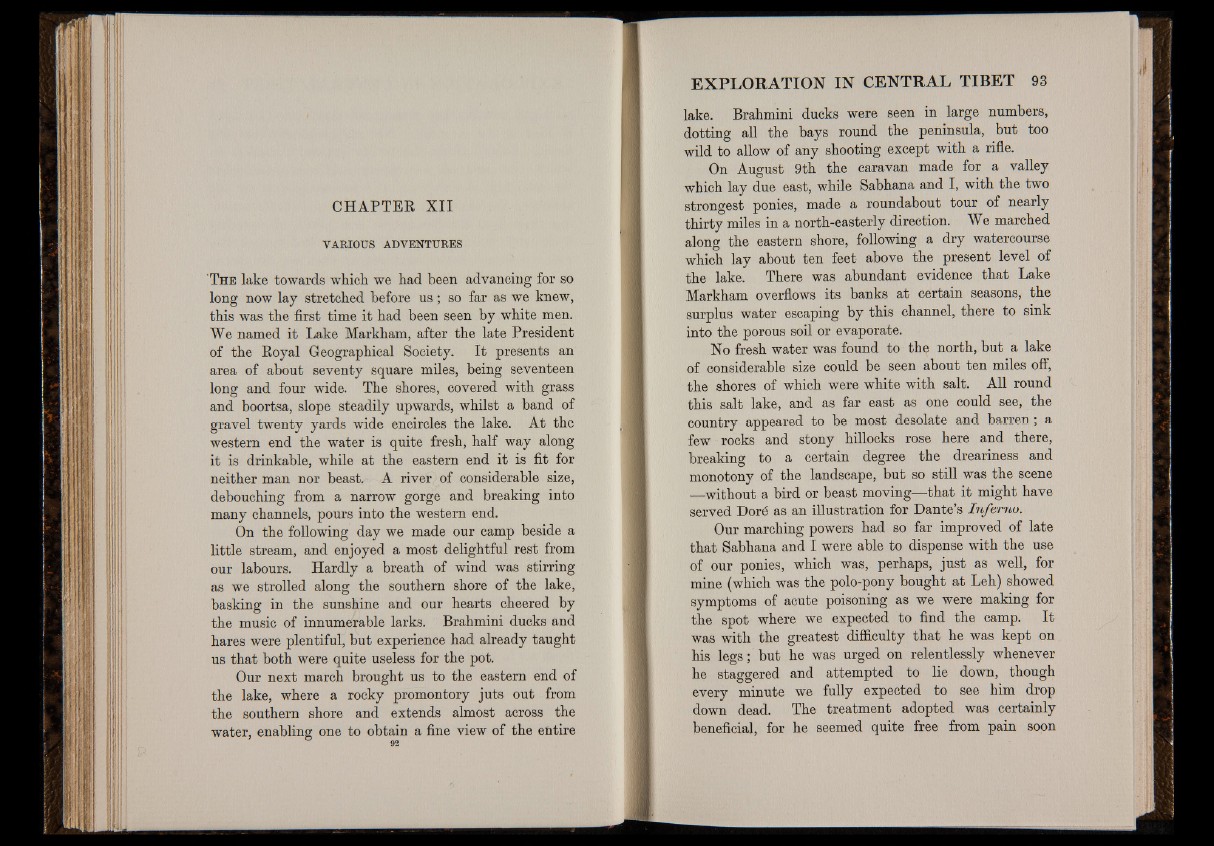
CHAPTER X II
VARIOUS ADVENTURES
The lake towards which we had been advancing for so
long now lay stretched before u s ; so far as we knew,
this was the first time it had been seen by white men.
We named it Lake Markham, after the late President
of the Royal Geographical Society. I t presents an
area of about seventy square miles, being seventeen
long and four wide. The shores, covered with grass
and boortsa, slope steadily upwards, whilst a band of
gravel twenty yards wide encircles the lake. At the
western end the water is quite fresh, half way along
it is drinkable, while at the eastern end it is fit for
neither man nor beast, A river of considerable size,
debouching from a narrow gorge and breaking into
many channels, pours into the western end.
On the following day we made our camp beside a
little stream, and enjoyed a most delightful rest from
our labours. Hardly a breath of wind was stirring
as we strolled along the southern shore of the lake,
basking in the sunshine and our hearts cheered by
the music of innumerable larks. Brahmini ducks and
hares were plentiful, but experience had already taught
us that both were quite useless for the pot.
Our next march brought us to the eastern end of
the lake, where a rocky promontory juts out from
the southern shore and extends almost across the
water, enabling one to obtain a fine view of the entire
92
lake. Brahmini ducks were seen in large numbers,
dotting all the bays round the peninsula, but too
wild to allow of any shooting except with a rifle.
On August 9th the caravan made for a valley
which lay due east, while Sabhana and I, with the two
strongest ponies, made a roundabout tour of nearly
thirty miles in a north-easterly direction. We marched
along the eastern shore, following a dry watercourse
which lay about ten feet above the present level of
the lake. There was abundant evidence that Lake
Markham overflows its banks at certain seasons, the
surplus water escaping by this channel, there to sink
into the porous soil or evaporate.
No fresh water was found to the north, but a lake
of considerable size could be seen about ten miles off,
the shores of which were white with salt. All round
this salt lake, and as far east as one could see, the
country appeared to be most desolate and barren; a
few rocks and stony hillocks rose here and there,
breaking to a certain degree the dreariness and
monotony of the landscape, but so still was the scene
—without a bird or beast moving—that it might have
served Dore as an illustration for Dante’s Inferno.
Our marching powers had so far improved of late
that Sabhana and I were able to dispense with the use
of our ponies, which was, perhaps, just as well, for
mine (which was the polo-pony bought at Leh) showed
symptoms of acute poisoning as we were making for
the spot where we expected to find the camp. It
was with the greatest difficulty that he was kept on
his legs; but he was urged on relentlessly whenever
he staggered and attempted to lie down, though
every minute we fully expected to see him drop
down dead. The treatment adopted was certainly
beneficial, for he seemed quite free from pain soon